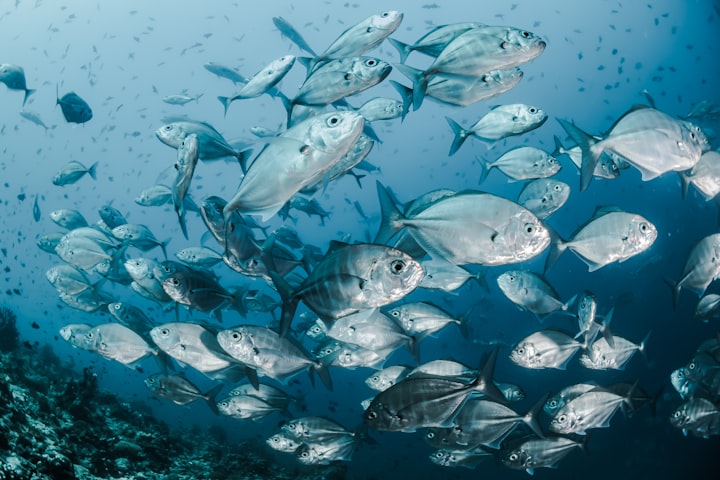
Introduction
The world beneath the surface of the ocean is a realm of mystery and wonder, inhabited by a diverse array of marine life. Among these inhabitants are fish, the most numerous and varied vertebrates on the planet. As we delve deeper into the study of aquatic ecosystems, questions arise about the behavior and physiology of these underwater creatures, one of which is the intriguing inquiry: Do fishes sleep in the ocean? In this article, we will embark on a journey to unravel the enigmatic world of fish sleep, exploring the scientific evidence, theories, and implications of this phenomenon.
Defining Sleep: A Complex Phenomenon
Before we dive into the specifics of fish sleep, it's essential to understand what sleep entails. Sleep is a complex physiological state observed in a wide range of animals, including humans. It involves a period of reduced consciousness and responsiveness, accompanied by distinctive changes in brain activity and behavior. Sleep is not only a time for rest and recuperation but also plays a crucial role in various cognitive, metabolic, and immune functions.
Sleep Among Different Species
When considering sleep in animals, it's important to recognize that sleep patterns can vary significantly across species. While some animals, like humans, experience consolidated periods of deep sleep, others, such as dolphins and certain bird species, exhibit unihemispheric sleep – a phenomenon where only one hemisphere of the brain sleeps at a time, allowing the animal to remain partially alert and responsive.
Fish Sleep: A Surprising Discovery
Early observations of fish behavior led scientists to question whether fish sleep at all. Unlike mammals and birds, fish lack eyelids and obvious signs of sleep, such as periods of immobility. However, research has uncovered fascinating insights into the sleep patterns of fish, challenging our preconceptions.
Evidence of Fish Sleep
Scientific investigations into fish sleep have revealed remarkable findings. Electroencephalogram (EEG) studies, which measure electrical activity in the brain, have shown that certain fish species exhibit distinct sleep patterns. For example, zebrafish and certain species of perch display periods of reduced brain activity and increased rest during specific times, suggesting a sleep-like state.
Furthermore, studies utilizing advanced imaging techniques have revealed changes in brain connectivity and neuronal activity in sleeping fish, akin to the processes observed in other animals during sleep. These discoveries point to the existence of sleep-like states in fish, although they may differ significantly from the conventional sleep patterns observed in mammals.
Variability in Fish Sleep
Fish sleep patterns are not uniform across species. Some fish, such as sharks, exhibit patterns of rest by reducing their activity and seeking shelter, possibly indicating a form of sleep. Other species, like some reef fish, may engage in periodic rest without undergoing a deep sleep state. The diverse range of fish sleep patterns highlights the need for further research to understand the underlying mechanisms and functions of sleep in different aquatic species.
Potential Functions of Fish Sleep
The purpose of sleep in fish remains a subject of scientific investigation and debate. Just as sleep serves various vital functions in other animals, fish sleep may play a role in processes such as memory consolidation, energy conservation, and immune system maintenance. Some researchers speculate that fish sleep might help them navigate their complex underwater environments more effectively, enhancing their chances of survival.
Adaptations to an Aquatic Environment
The unique challenges posed by underwater living have likely shaped the sleep patterns of fish. Unlike terrestrial animals, fish face constant buoyancy, potential predation, and the need for efficient oxygen extraction. These factors may have led to the evolution of sleep patterns that differ from those of land-dwelling animals. Unihemispheric sleep, for instance, could enable fish to maintain vigilance while still engaging in restful behaviors.
Conclusion: Unraveling the Mystery
In the depths of the ocean, a realm of captivating behaviors and adaptations unfolds before us. The question of whether fishes sleep in the ocean has sparked a wave of scientific curiosity and inquiry. While the answer remains complex and multifaceted, the evidence suggests that fish do indeed experience sleep-like states, albeit in ways that diverge from the sleep patterns of mammals and birds.
As our understanding of fish sleep continues to evolve, researchers will undoubtedly unveil more insights into the mechanisms, functions, and adaptations associated with this enigmatic phenomenon. The exploration of fish sleep not only enriches our knowledge of aquatic life but also sheds light on the broader evolutionary and physiological aspects of sleep across the animal kingdom.
In the ceaseless rhythm of the ocean, as fish glide through the depths and currents, the mysteries of their sleep remain a captivating frontier, awaiting discovery by intrepid scientists and curious minds alike.
About the Creator
Arish Ali
The world is yours!





Comments
There are no comments for this story
Be the first to respond and start the conversation.